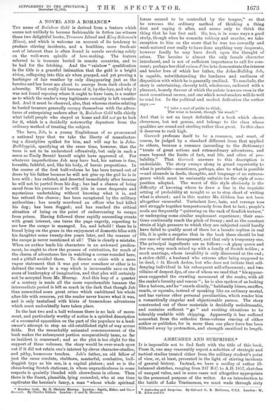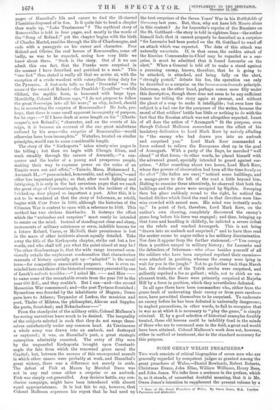AMBUSHES AND SURPRISES.* IT is impossible not to find fault
with the title of this book. From it, one may reasonably expect a selection of strategic and tactical studies treated either from the military student's point of view, or, at least, presented in the light of stirring incidents of general history. Instead, we have a medley of rather ill- balanced sketches, ranging from 247 B.O. to A.D.1857, sketches of unequal value, and in some cases not altogether appropriate to the presumed purpose of the writer. As an introduction to the battle of Lake Trasimenus, we must wade through sixty
• Ambushes and Surprises. By Colonel G. B. Mailmen, 0.8.1. London : W. H. Allen and Co.
pages of Hannibal's life and career to find the ill-starred Flaminius disposed of in five. Is it quite fair to head a chapter thus made up, "Lake Trasimenns " P The mythical story of Roncesvilles is told in four pages, and mostly in the words of the " Song of Roland ;" yet the chapter begins with the birth of Charles Martel, rambles through the life of Charlemagne, and ends with a panegyric on his career and character. Poor Roland and Olivier, the real heroes of Roncesvalles, come off badly, as was to be expected, seeing how very little we know about them. " Such is the story. Out of it we can admit this one fact, that the Franks were surprised in the manner I have described and perished to a man." This " one fact " thus stated is really all that we arrive at, with the exception of a crude woodcut with caterpillars doing duty for the Pyrenees. A foot-note tells us that Durendal ' was the name of the sword of Roland—the Frankish' Excalibur '—while Olifant; the mythic horn, is honoured with large type. Mercifully, Colonel Malleson says, " I do not propose to follow the great Sovereign into all his wars ;" as why, indeed, should he, in recounting the surprise of Roncesvalles ? He feels, per- haps, that there is some small apparent incongruity of purpose, for he says :—" If I have dealt at some length on his " [Charle- magne's, not Roland's] " character, and on the events of his reign, it is because an account of the one great misfortune suffered by his arms—the surprise of Roncesvalles—would otherwise have been incomplete." Waterloo, treated on similar principles, would run to some considerable length.
The story of the "Kerkoporta " takes ninety-nine pages in the telling ; but then we begin with Clieligis Khan, and work steadily through the careers of Amnrath,—" a con- queror and the leader of a young and prosperous people, making their way to supreme power on the ruins of an Empire worn out and effete,"—Tainuir, Musa, Muhammed I., Amurath pure-minded, honourable, and religions,"—and other less important people; so that, after much fighting and intriguing, it is only in the last seventeen pages that we reach the great siege of Constantinople, in which the incident of the bricked-up door played so important a part. After this, it is not to be wondered at that the story of Inkerman, as retold, begins with Czar Peter in 1689, although the historian of the Crimean War is content to open with a reference to 1848. This method has two obvious drawbacks. It destroys the effect which the "ambushes and surprises" must surely be intended to create on the mind. Instead of standing out clear and sharp, monuments of military astuteness or error, indelible lessons for a future Roland, Yarns, or McNeill, their prominence is lost in the maze of other incidents almost equally detailed. Take away the title of the Kerkoporta chapter, strike out but a few words, and who shall tell you what the point aimed at may be ? The other disadvantage is, that the wide range traversed occa- sionally entails the unpleasant condensation that characterises manuals of history specially got up—" adapted " is the usual term—for competitive examination purposes. One is even re- minded here and there of the historical summary presented by one of Leech's enfants terribles :—" I asked Mr. — and Miss to name some of the remarkable events from the year 700 to the year 600 B.C., and they couldn't. But I can—and—the second Messenian War commenced; and—the poet Tyrtesus flourished ; Byzantium was founded by the inhabitants of Megara ; Draeo gave laws to Athens; Terpander of Lesbos, the musician and poet, Thales of Miletns, the philosopher, .A.Ictts and Sappho, the poets, flourished; and Nebnchadnez---" From the standpoint of the military critic, Colonel Malleson's far-roving narratives leave much to be desired. The inequality of the subjects selected is such that they do not range them- selves satisfactorily under any common head. At Trasimenus a whole army was drawn into an ambush, and destroyed or captured ; it was, on Hannibal's part, a great strategic conception admirably executed. The entry of fifty men by the unguarded Kerkoporta brought upon Constanti- nople the fate from which the renowned geese saved the Capitol; but, between the success of this unsuspected assault in which other causes were probably at work, and Hannibal's great victory, there was a difference not merely in scale. The defeat of Fink at Maxen by Marshal Daun was not in any real sense either a surprise or an ambush. Fink was simply out-generalled. Any decisive battle, any con- clusive campaign, might have been introduced with almost equal appropriateness. It is but fair to say, however, that Colonel Malleson expresses his regret that lie had used up the best surprizes of the Seven Years' War in his Battlefields of Germany last year. But, then, why not have left Maxen alone in this context P As for Lecourbe's repulse of the Russians on the St. Gotthard—the story is told in eighteen lines—the author himself feels that it cannot properly be described as a surprise' "for Lecourbe had been posted on the St. Gotthard to ward of an attack which was expected. The date of this attack was naturally uncertain. If, in that sense, the sudden attack of the Russian Commander-in-Chief may be regarded as a sur- prise, it must be admitted that it found Lecourbe on the alert." When a General is told off to make a stand against a pursuing enemy, knows, therefore, that he is going to be attacked, is attacked, and being fully on the alert, "strongly posted," defeats his foe, the operation can only be described as a surprise on the locus-a-non,-Tacendo principle.
Inkerman, on the other hand, perhaps comes more fitly under this description, though there does not seem to be any sufficient reason for telling the story again at present, and without the ghost of a map to make it intelligible ; bat even here the subject is a bad one for the purposes of the writer, because the moral of that soldiers' battle has little or nothing to do with the fact that the Russian attack was not altogether expected. Least of all does the action of "Azumgarh" fit the pqrpose, even though Colonel Malleson somewhat mars the effect of his laudatory dedication to Lord Mark Kerr by naïvely alludipg to "the enemy who had drawn you into an ambush and surprised you." Lord Mark Kerr commanded
force ordered to relieve the Europeans shut up in the goal of Azumgarh. With a party of the Bays, he marched " well
ahead " of that force,—in other words, be placed himself with the advanced guard, specially intended to guard against sur- prises. "After marching about two hours, Lord Mark Kerr, whose fine powers of observation had been all the time keenly on
the alert " [the italics are ours] " noticed some buildings, and a mango-grove to the left of the road d, little beyond him.
Halting to examine these attentively, he observed that both the buildings and the grove were occupied by Sipahis. Sweeping then his glass suddenly round to the right, he noticed the banked ditches which lined the road in that direction were wise crowded with armed men. His mind was instantly made up." In point of fact, therefore, Lord Mark Kerr, on the author's own showing, completely discovered the enemy's game long before his force was engaged ; and then, bringing up that force and handling it skilfully, he inflicted a severe defeat on the rebels and reached Azumgarh. This is not being "drawn into an ambush and surprised ;" and to have thus read the matter seems to argue rather a lax military discrimination Nor does it appear from the farther statement,—" You occupy then a position unique in military history ; for Lecourbe and the defenders of Inkerman—who alone besides yourself of all the soldiers who have been surprised repulsed their enemies— were attacked in position, whereas the enemy were lying in wait for you in the jungle." Not to go further back than March last, the defenders of the Tofrik zereba were surprised, and gallantly repulsed a foe as gallant ; while, not to shirk an un- pleasant truth, the Boers were primarily surprised at Majaba. Hill by a force in position, which they nevertheless defeated.
In all ages there have been commanders who, either from the grave fault of underrating their enemy or from pure careless- ness, have permitted themselves to be surprised. To underrate an enemy before he has been defeated is universally dangerous ; to neglect precautions, in other words, to fail to recognise that in war as at whist it is necessary to "play the game," is simply criminal. If, by a good selection of historical examples forcibly treated, these old lessons could be indelibly fixed in the minds of those who are to command men in the field, a great end would have been attained. Colonel Malleson's work does not, however, either in method or treatment, rise to the standard necessary for this purpose.



















































 Previous page
Previous page